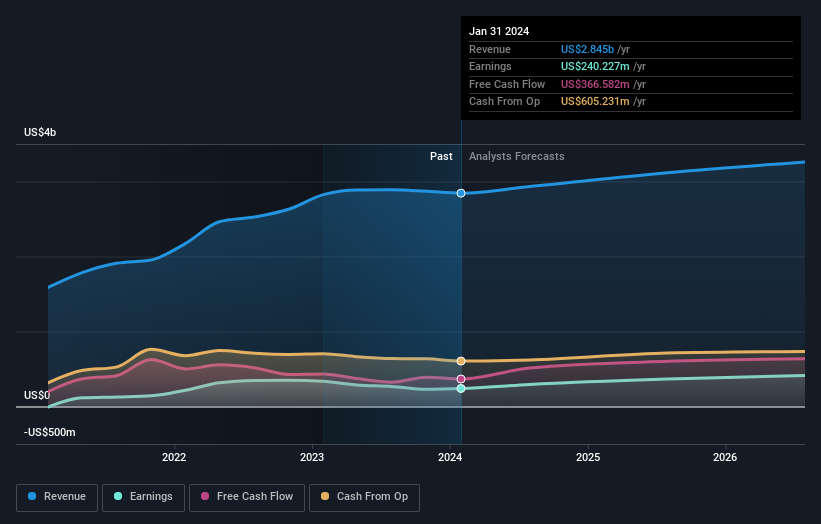- United States
- /
- Hospitality
- /
- NYSE:MTN
Earnings Report: Vail Resorts, Inc. Missed Revenue Estimates By 6.5%

As you might know, Vail Resorts, Inc. (NYSE:MTN) last week released its latest second-quarter, and things did not turn out so great for shareholders. Vail Resorts missed analyst forecasts, with revenues of US$1.1b and statutory earnings per share (EPS) of US$5.76, falling short by 6.5% and 3.8% respectively. Following the result, the analysts have updated their earnings model, and it would be good to know whether they think there's been a strong change in the company's prospects, or if it's business as usual. Readers will be glad to know we've aggregated the latest statutory forecasts to see whether the analysts have changed their mind on Vail Resorts after the latest results.
View our latest analysis for Vail Resorts

Taking into account the latest results, the current consensus from Vail Resorts' nine analysts is for revenues of US$2.93b in 2024. This would reflect a modest 3.1% increase on its revenue over the past 12 months. Per-share earnings are expected to surge 23% to US$7.80. In the lead-up to this report, the analysts had been modelling revenues of US$3.05b and earnings per share (EPS) of US$8.98 in 2024. The analysts seem less optimistic after the recent results, reducing their revenue forecasts and making a substantial drop in earnings per share numbers.
It'll come as no surprise then, to learn that the analysts have cut their price target 5.8% to US$243. That's not the only conclusion we can draw from this data however, as some investors also like to consider the spread in estimates when evaluating analyst price targets. There are some variant perceptions on Vail Resorts, with the most bullish analyst valuing it at US$272 and the most bearish at US$201 per share. This is a very narrow spread of estimates, implying either that Vail Resorts is an easy company to value, or - more likely - the analysts are relying heavily on some key assumptions.
Of course, another way to look at these forecasts is to place them into context against the industry itself. The period to the end of 2024 brings more of the same, according to the analysts, with revenue forecast to display 6.4% growth on an annualised basis. That is in line with its 7.3% annual growth over the past five years. By contrast, our data suggests that other companies (with analyst coverage) in a similar industry are forecast to see their revenues grow 9.6% per year. So although Vail Resorts is expected to maintain its revenue growth rate, it's forecast to grow slower than the wider industry.
The Bottom Line
The most important thing to take away is that the analysts downgraded their earnings per share estimates, showing that there has been a clear decline in sentiment following these results. On the negative side, they also downgraded their revenue estimates, and forecasts imply they will perform worse than the wider industry. The consensus price target fell measurably, with the analysts seemingly not reassured by the latest results, leading to a lower estimate of Vail Resorts' future valuation.
Following on from that line of thought, we think that the long-term prospects of the business are much more relevant than next year's earnings. We have estimates - from multiple Vail Resorts analysts - going out to 2026, and you can see them free on our platform here.
However, before you get too enthused, we've discovered 3 warning signs for Vail Resorts that you should be aware of.
If you're looking to trade Vail Resorts, open an account with the lowest-cost platform trusted by professionals, Interactive Brokers.
With clients in over 200 countries and territories, and access to 160 markets, IBKR lets you trade stocks, options, futures, forex, bonds and funds from a single integrated account.
Enjoy no hidden fees, no account minimums, and FX conversion rates as low as 0.03%, far better than what most brokers offer.
Sponsored ContentNew: Manage All Your Stock Portfolios in One Place
We've created the ultimate portfolio companion for stock investors, and it's free.
• Connect an unlimited number of Portfolios and see your total in one currency
• Be alerted to new Warning Signs or Risks via email or mobile
• Track the Fair Value of your stocks
Have feedback on this article? Concerned about the content? Get in touch with us directly. Alternatively, email editorial-team (at) simplywallst.com.
This article by Simply Wall St is general in nature. We provide commentary based on historical data and analyst forecasts only using an unbiased methodology and our articles are not intended to be financial advice. It does not constitute a recommendation to buy or sell any stock, and does not take account of your objectives, or your financial situation. We aim to bring you long-term focused analysis driven by fundamental data. Note that our analysis may not factor in the latest price-sensitive company announcements or qualitative material. Simply Wall St has no position in any stocks mentioned.
About NYSE:MTN
Vail Resorts
Through its subsidiaries, operates mountain resorts and regional ski areas in the United States and internationally.
Good value with proven track record and pays a dividend.


